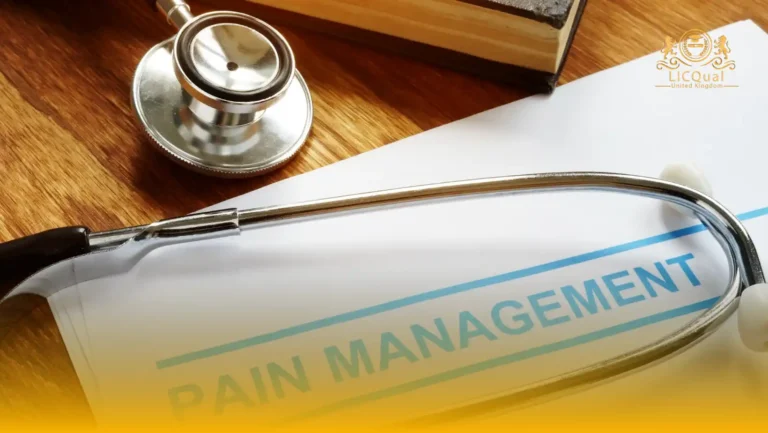The LICQual Level 6 Diploma in Healthcare Law and Ethics is an advanced program designed to provide learners with comprehensive knowledge and skills to navigate legal frameworks and ethical challenges within healthcare settings. This diploma focuses on combining healthcare regulations, professional ethics, and compliance standards, enabling learners to ensure safe, accountable, and legally compliant healthcare practices.
Learners will explore essential concepts in healthcare law and ethics, including regulatory frameworks, patient rights, professional accountability, consent, confidentiality, and ethical decision-making. The course emphasizes practical applications, allowing learners to analyze complex scenarios, implement compliance strategies, and apply ethical principles in healthcare management. By integrating theory with real-world examples, learners gain a clear understanding of how legal and ethical standards guide healthcare operations and enhance organizational integrity.
The curriculum covers critical topics such as healthcare legislation, risk management, professional ethics, governance, accountability, and regulatory compliance. Learners will also develop essential skills in critical thinking, policy evaluation, risk assessment, and decision-making, which are vital for maintaining legal and ethical standards while optimizing healthcare service delivery.
Through the LICQual Level 6 Diploma in Healthcare Law and Ethics, learners gain recognition for advanced expertise in healthcare legal compliance and ethical leadership, enabling them to develop policies, implement ethical practices, and ensure adherence to healthcare laws. This diploma provides a structured framework for addressing legal and ethical challenges, safeguarding patient rights, and promoting professional integrity across healthcare organizations.
The course stands out as a comprehensive qualification that merges legal knowledge with ethical reasoning, empowering learners to lead healthcare operations confidently, make informed decisions, and maintain high standards of compliance. By completing this diploma, learners achieve mastery in healthcare law and ethics, preparing them to navigate complex healthcare environments while upholding legal and moral responsibilities.
Course Overview
Qualification Title
LICQual Level 6 Diploma in Healthcare Law and Ethics
Total Units
6
Total Credits
120
GLH
480
Qualification #
LICQ2200784
Qualification Specification
To enroll in the LICQual Level 6 Diploma in Healthcare Law and Ethics, applicants must meet the following criteria:
|
Qualification# |
Unit Title |
Credits |
GLH |
|---|---|---|---|
|
LICQ2200784-1 |
Principles of Healthcare Law |
20 |
80 |
|
LICQ2200784-2 |
Healthcare Ethics and Professional Accountability |
20 |
80 |
|
LICQ2200784-3 |
Consent, Confidentiality, and Patient Rights |
20 |
80 |
|
LICQ2200784-4 |
Regulatory Compliance and Risk Management |
20 |
80 |
|
LICQ2200784-5 |
Ethical Challenges and Decision-Making in Healthcare |
20 |
80 |
|
LICQ2200784-6 |
Evaluation, Reporting, and Continuous Improvement |
20 |
80 |
By the end of this course, learners will be able to:
Unit 1: Principles of Healthcare Law
- Understand the legal frameworks governing healthcare practice.
- Analyse the roles, responsibilities, and rights of patients and healthcare professionals.
- Evaluate legislation related to consent, confidentiality, and duty of care.
- Apply international legal standards and compliance requirements in healthcare settings.
Unit 2: Healthcare Ethics and Professional Accountability
- Understand key ethical principles and theories in healthcare.
- Analyse professional codes of conduct and their application in clinical practice.
- Apply ethical reasoning to complex healthcare situations.
- Demonstrate accountability and professional responsibility in decision-making.
Unit 3: Consent, Confidentiality, and Patient Rights
- Examine legal and ethical requirements for obtaining informed consent.
- Analyse confidentiality, data protection, and patient privacy laws.
- Evaluate patient rights across different healthcare environments.
- Implement strategies to ensure compliance with patient protection standards.
Unit 4: Regulatory Compliance and Risk Management
- Explore healthcare regulations, policies, and quality standards.
- Identify and manage legal and ethical risks in healthcare practice.
- Develop strategies to maintain regulatory compliance and readiness for audits.
- Apply risk assessment tools to enhance patient safety and organisational accountability.
Unit 5: Ethical Challenges and Decision-Making in Healthcare
- Analyse ethical dilemmas encountered in clinical and administrative settings.
- Apply structured frameworks for ethical decision-making.
- Resolve conflicts between legal obligations and ethical considerations.
- Evaluate case studies to develop practical problem-solving skills.
Unit 6: Evaluation, Reporting, and Continuous Improvement
- Conduct evaluations of legal and ethical compliance in healthcare settings.
- Analyse outcomes to identify lessons learned and areas for improvement.
- Develop reports to inform organisational policies and decision-making.
- Implement continuous improvement strategies to enhance ethical and legal standards.
This advanced qualification is designed for experienced healthcare professionals seeking to enhance their knowledge and skills in legal and ethical practice. The course is ideal for:
- Healthcare managers and senior staff responsible for policy implementation and compliance.
- Clinical leaders and practitioners managing patient care and ethical decision-making.
- Legal advisors, compliance officers, and risk managers working within healthcare organisations.
- Professionals involved in safeguarding, patient rights, and regulatory adherence.
- Senior healthcare professionals seeking to strengthen their Continuing Professional Development (CPD) in healthcare law and ethics.
- Individuals aiming to improve organisational policies, patient safety, and professional accountability.
- Professionals committed to applying ethical frameworks and legal standards in complex healthcare scenarios.
By enrolling in this diploma, learners will gain the expertise, practical skills, and professional credentials needed to lead initiatives, ensure regulatory compliance, and promote best practices in ethical and legal healthcare management.
To deliver the LICQual Level 6 Diploma in Healthcare Law and Ethics effectively, centres must maintain high standards of training, resources, and learner support. Key requirements include:
- Qualified and Competent Staff: Tutors and assessors must hold relevant qualifications in healthcare law, ethics, healthcare management, or related disciplines, and possess practical experience in healthcare legal and ethical practice.
- Comprehensive Learning Materials: Centres must provide learners with up-to-date course materials, guides, case studies, and access to tools and resources relevant to healthcare law, ethics, and compliance.
- Access to Technology and Resources: Learners should have access to computers, reliable internet, and any necessary software, legal databases, or online resources required to complete practical exercises and assessments.
- Safe and Supportive Learning Environment: Centres should provide classrooms, study areas, or virtual learning platforms that encourage engagement, collaboration, and effective learning.
- Assessment and Quality Assurance Procedures: Centres must implement robust assessment systems, including formative and summative assessments, feedback mechanisms, and monitoring of learner progress.
- Commitment to Continuing Professional Development (CPD): Staff must regularly update their knowledge and skills in healthcare law and ethics to ensure high-quality course delivery.
- Compliance with Regulatory Standards: Centres must adhere to all relevant local and national regulations and maintain accurate records of learner progress, assessments, and qualifications awarded.
By meeting these requirements, centres can ensure learners receive a high-quality learning experience, gaining the knowledge, practical skills, and confidence needed to succeed in advanced healthcare law and ethics roles.
Assessment and Verification
All units within this qualification are subject to internal assessment by the approved centre and external verification by LICQual. The qualification follows a criterion-referenced assessment approach, ensuring that learners meet all specified learning outcomes.
To achieve a ‘Pass’ in any unit, learners must provide valid, sufficient, and authentic evidence demonstrating their attainment of all learning outcomes and compliance with the prescribed assessment criteria. The Assessor is responsible for evaluating the evidence and determining whether the learner has successfully met the required standards.
Assessors must maintain a clear and comprehensive audit trail, documenting the basis for their assessment decisions to ensure transparency, consistency, and compliance with quality assurance requirements.







